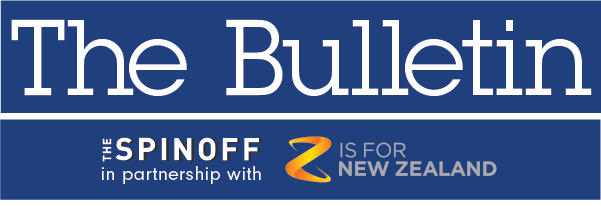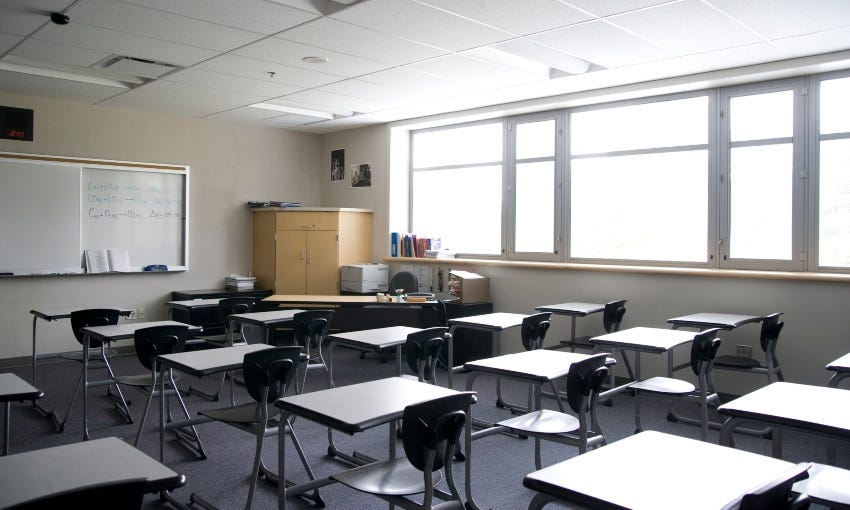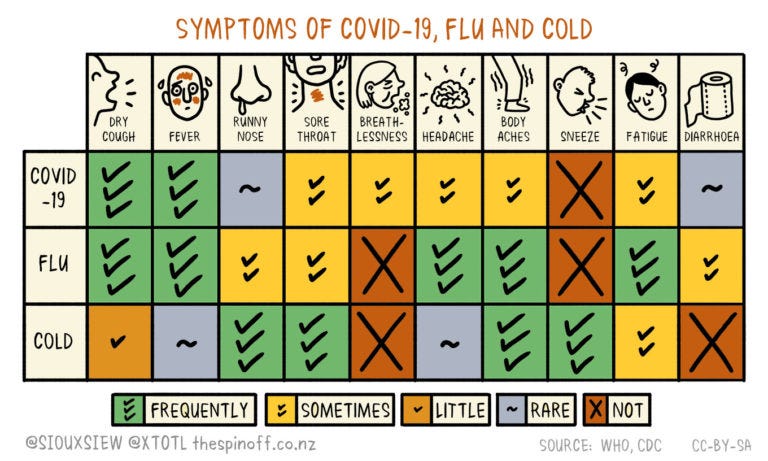Dunedin school closed after student tests positive for Covid-19, others staying open
They're still considered to be the safest place for kids to be

Good morning and welcome to The Bulletin for Wednesday 18 March, by Alex Braae for The Spinoff. Presented in partnership with Z Energy.
In today’s edition: Dunedin school to close and clean after positive Covid-19 test, massive economic rescue package announced, and tourists who didn’t self-isolate facing deportation.

(Getty Images)
There are now 12 confirmed Covid-19 patients in New Zealand. The latest confirmed case is a student at Logan Park High School in Dunedin, who is understood to have contracted it from his father who recently returned from Europe. Stuff reports that the school will be closed for two weeks, with a deep clean now underway. Contact tracing will also take place, and those the student came into contact with will be required to go into self-isolation. It is another example of family transmission, however, there is still no evidence of any cases of community transmission within New Zealand.
The nature of Covid-19 in New Zealand is therefore still believed to be one of isolated cases, rather than a wider outbreak. The NZ Herald has given a rundown of the stories of each person, written when there were 11 confirmed cases, and it included a note about the student who was showing symptoms.
There are no plans for wider school closures at this stage, however that comes with the standard caveat that situations can change quickly. Yesterday Radio NZ spoke to the Principals Federation, who urged parents to keep their kids in school now, partly because with only one case nationwide there isn't really any necessity, and partly because each day of class time this year could be crucial, with disruptions possible. "I would just encourage parents to be thinking carefully about the importance of continuing to see their child go to school. Attendance every day that a school is open is really vital," said Principal's Federation head Perry Rush.
The option to close schools remains open, reports Stuff, though education minister Chris Hipkins maintains that in general they are safe places for students to be. The international experience on this is mixed, with some countries choosing too, but other countries who had managed outbreaks not seeing the need. One option that is currently in front of the ministry is moving or extending the school holidays, if a closure is necessary.
In more general terms, how are the new rules on gatherings being interpreted, when rather than an event it is simply a collection of 500 or more people? Jordan Bond at Radio NZ has reported on the different situation for places like malls, which are facing a different sort of situation to ticketed events. Director-General of Health Ashley Bloomfield has clarified that it's not about 500 people being a magic number – rather, it's about the principle of not holding large gatherings. For the performing arts sector, events are generally being cancelled wholesale – Sam Brooks has surveyed what that means for performers and practitioners, who are now in an exceptionally difficult position.
Meanwhile, testing is currently being ramped up, reports Newsroom's Marc Daalder, with the announcement yesterday that more than 500 were underway, and a directive to doctors to widen their criteria in making decisions about whether to test. There have been concerns raised that the criteria was previously too stringent, with only 512 carried out since the beginning of the process. Capacity is also being increased, and by the end of the week there will be capability to run up to 1500 tests a day. And speaking of testing, I would strongly encourage you to read the latest piece from Dr Siouxsie Wiles, who has explained the testing process, and given an illustrated symptom guide for how Covid-19 differs from influenza or a cold.

The massive economic rescue package has been released, with billions of dollars being put towards wage subsidies, benefit raises, tax relief for businesses and health spending. The details of it can be found in this cheat sheet, and a range of reactions from experts in economics, social services and the health sector have been collected here. The $12 billion in new spending has been described by the PM as "the most significant peace-time economic plan in modern New Zealand history”. The details of how it breaks down can be found in those articles, but there are a few more specific questions I've seen people asking which are worth addressing:
Will income protection measures apply to contractors and freelancers who can't work? Yes, people who are self-employed full-time can claim $585 per week, provided they are unable to work due to self-isolation. The wage subsidy scheme will also be open to those who are sole traders, and provisional tax change thresholds will largely matter most to those who are earning less. Full details can be found on this Work and Income page.
Is the rise in benefit rates permanent or temporary? There are three main changes to the benefit system. The first is a one-off increase of $25 a week for the main benefit, which will be permanent, and will be paid on top of rises linked to wage growth indexation. The second is a doubling of the Winter Energy Payment for 2020 only – this goes to seniors and beneficiaries. And the third change is the extension of eligibility for parents to receive the In Work Tax Credit. Incidentally, the benefit rise was exactly what was recommended by the government's own Welfare Expert Advisory Group, and then not implemented at the time.
Are we still looking at job losses, and if so, how many? Yes, there will still be job losses even with the wage subsidy scheme and other measures. How many is at this stage still an impossible question to answer. As finance minister Grant Robertson put it yesterday, "we are going to see many New Zealanders lose their jobs, and some businesses fail, we will have an extended period of deficits and our debt as a country will have to substantially increase."
Where is the money for all of this coming from? Are taxes going up? The stimulus is coming out of increased borrowing, rather than increased taxes. Thomas Coughlan at Stuff has done a really useful explainer about the relationship between tax, spending and debt, and how they relate to the sums of money that have been put out there. Right now, the country is in a position of very low debt – arguably thanks to a bipartisan political obsession with running surpluses in case of the proverbial rainy day which has now arrived.
Two travellers have been put in enforced quarantine after failing to self-isolate on arrival, reports One News. At the end of that period, they'll be required to leave – or be deported outright, which could have ongoing legal consequences. It's an escalation in the sort of tactics being used to enforce compliance with the travel restrictions, and Immigration NZ has warned that they expect everyone to follow them.
Speaking of arrivals at airports, a reader who is now in self-isolation sent in this description of the arrival process he had coming in from Chicago:
"We were warned about self-isolation measures at check-in in Chicago, at boarding, and on the plane by the air stewards. Upon arrival in Auckland, we filled out screening forms similar to the immigration and customs declaration, and were questioned by officials before proceeding to immigration. It appeared some passengers were randomly selected for additional screening.
The process seems to rely on honest reporting of travel history, symptoms and contact details. All the officials were friendly and welcoming, and the process didn’t feel stringent (for better or worse)."
Supermarkets are urging shoppers to not buy more than they need, reports the ODT. Their message is that we're not at risk of shortages, but bulk buying means that shelves might end up cleared out before they can be replenished. The images of empty shelves then contribute unnecessarily to community fear.
Here's a feature on some of the Covid-19 plans being made by companies who are particularly well prepared. Those looked at by Newsroom's Nikki Mandow include Ports of Auckland, and Z Energy (our partners on The Bulletin) and the measures include basically thinking about every level in which a staff member might come into contact with another person, and what precautions should be made at each of those levels. For the Ports especially, vetting of every visitor and supplier coming on site is of absolute importance.
ACT leader David Seymour has called on MPs and top public servants to take a pay cut in solidarity with those affected by the downturn, reports the NZ Herald. He says it would show parliamentarians are leading from the front. Green Party co-leader James Shaw agreed, saying that his party supported MP pay being pegged to the median wage, which is likely to reduce in the coming months. Just a bit of context on MP pay – it has been frozen since 2018.
We're running daily updates on Covid-19 news – for all of the latest updates, please go here at any time of the day.
Got some feedback about The Bulletin, or anything in the news?
Drop us a line at thebulletin@thespinoff.co.nz

Right now on The Spinoff: Elizabeth Engledow, a novice reviewer, tries to get her head around writing reviews of some of the classics. Alex Casey looks back on what may have been the most wild and weird couple of nights yet seen on The Bachelorette. Alice Neville speaks to some local craft beer brewers who are getting recognition as being among the best in the world. Josie Adams has an incredibly useful cheat sheet on how best to do social distancing, which is necessary to keep any outbreak contained. And Emily Writes goes down the rabbit hole on some of the more absurd conspiracy theories flying around.
For a feature today, a look at Britain's bizarre and rapidly reversed approach to the Covid-19 outbreak. Buzzfeed have chronicled the policy u-turn, which originally intended to allow the virus to spread, so that herd immunity could be built up among the population. To use the correct British term for that approach, it was quickly found to be bonkers. Here's an excerpt:
The mitigation strategy "focuses on slowing but not necessarily stopping epidemic spread — reducing peak healthcare demand while protecting those most at risk of severe disease from infection", the report said, reflecting the UK strategy that was outlined last week by Boris Johnson and the chief scientific adviser Patrick Vallance.
But the approach was found to be unworkable. "Our most significant conclusion is that mitigation is unlikely to be feasible without emergency surge capacity limits of the UK and US healthcare systems being exceeded many times over," perhaps by as much as eight times, the report said.
Spark Sport is effectively going free to air for the next few months, with a massively reduced schedule, reportsStuff. It includes the English Premier League, the NBA and Formula 1 racing, which have all seen cancellations or postponement. As the NZ Herald reports, Sky Sport will not be following suit, after suffering both the loss of Super Rugby and a large chunk of their share price. They followed up yesterday with the news that a new NZ-only competition for Super Rugby teams might take place this year, run by NZ Rugby and broadcast by Sky – I'll believe that one when I see it happen.
That's it for The Bulletin. If you want to support the work we do at The Spinoff, please check out our membership programme.




